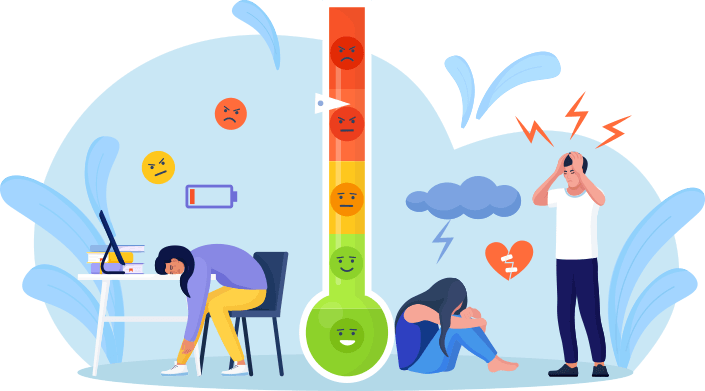
Click the button to start reading
Is Working Overtime Good for Business? The Effects of Long Hours on Productivity
Working overtime has long been seen as a badge of honor in the business world. If you’re working late, you must be working hard! However, recent research has shown that working overtime may not be as good for business as we thought.
Pushing your employees too hard for too long may end up having a negative effect on your bottom line. Not to mention an increase in employee turnover, which pushes your operating and training costs up.
There is space for overtime in your business strategy, but wise leaders will know when the best time to implement this is. You’ll need to be able to monitor productivity levels and make sure your staff isn’t being negatively affected by excessive work.
In this article, we’ll look at what overtime is, the pros and cons of working long hours, and the effects of long working hours on productivity and mental health.

Work Overtime Meaning
Overtime is working more hours than your contract requires. In some cases, working overtime may be voluntary, but it may be mandatory in other cases. Sometimes there are financial incentives to work overtime, such as time and half wages and bonuses.
In some cases, there is no reward for working overtime. It is expected and demanded of employees and is woven into their contract. The most extreme example of this is “crunch time,” which is common in the game industry. Companies require their staff to work extra hours and days to ensure the game releases on time.
Many people see working overtime as a sign of dedication and hard work. However, working too many hours can have negative consequences for both the employee and the business.
The Pros and Cons of Working Long Hours
There are pros and cons to working long hours. On the positive side, working overtime can lead to increased productivity and creativity. It can also show your employees that you’re committed to their success and willing to go the extra mile to get the job done.
However, working long hours can also have adverse effects on productivity and mental health. Excessive working hours can lead to employee burnout and increased stress. Short bursts of overtime are unlikely to have a negative impact on most people. The issue arises when employees are asked to overexert themselves for a more extended period.
The Pros of Overtime
- Increased productivity
- Increased creativity
- Deal with temporary busy periods
- Employees can earn extra money
- Good team players can shine
The Cons of Overtime
- Can lead to employee burnout
- Increased stress
- It may have a negative effect on mental health
- Costly if paying premium rates
- Increased employee turnover if too demanding
- Knocks the vital work/life balance

The Effects of Working Long Hours on Productivity
Working long hours can decrease productivity in several ways. When working long hours, employees tend to take more breaks, leave early or come in late the next day and lose concentration quickly. They may also feel too tired to complete the task at hand and take longer than usual.
When working overtime, employees are more likely to make errors due to working under pressure or feeling exhausted. This can result in late projects, client complaints, and a drop in quality of work which could damage your reputation as well as your bottom line.
These factors combined with working at a slower pace than usual could significantly reduce your overall productivity levels if not compensated with other strategies such as working overtime when needed instead of all the time!
Short bursts of mandatory overtime are the best way to schedule things for productivity. Employees will be able to reach into their reserve well of energy to help complete tasks and meet deadlines. This should lead to a temporary boost in productivity and help your business meet demand.
Long-term overtime is likely to have the opposite effect, especially if there is no financial motivation for the employee. When people overexert themselves for too long, they are more prone to distraction and errors.

The Effects of Working Long Hours on Health
As we mentioned above, working long hours can have negative effects on health. Symptoms include stress, anxiety, depression, and burnout, along with other physical symptoms such as headaches or back pain from sitting for extended periods without taking breaks.
Working overtime has been linked to an increased risk of heart disease and stroke, according to research by The American Heart Association (AHA).
Employees who work long hours are also at an increased risk for other health problems such as obesity and type II diabetes. If you ask too much of your employees for too long, you risk their own health, which is cruel and unfair. Conditions like this at work can easily lead to an increase in employee turnover as staff chooses to protect their own health.

Is Working Overtime Worth It For Employees?
Working overtime has become such an integral part of business culture that many people believe it’s essential for success. Many companies offer optional overtime shifts as standard practice. Some other companies may only provide additional hours at certain times of the year, such as the lead-up to Christmas.
Optional overtime can be an attractive idea for employees who may have unexpected bills or reasons they need extra money. The opportunity to pick up extra hours can alleviate issues in their home life.
Working long hours can be a way of showing that you are dedicated to your job and have a good work ethic. There’s the opportunity to impress your bosses and stand out when promotions roll around. For some people, working overtime can be a hobby or even an addiction.
Workaholics are individuals who push themselves to work to excess with additional hours. It’s a compulsion that they can’t help, an addiction just like any other. While this may seem like a good thing from a strictly business point of view, this is an unhealthy habit. If you have members of staff like this, they may require your intervention to make sure they don’t burn themselves out.

What Are the Main Reasons for Overtime?
Overtime happens for a reason. It shouldn’t be the standard company culture but rather only used to meet demands. Here are some of the main reasons your company may need to ask employees to work additional hours:
Cover for holidays
A colleague goes on holiday and has a considerable workload; their colleagues need to pick up the slack. Holidays are usually booked well in advance, so managers will be able to plan ahead to make sure there are no adverse effects on productivity.
One solution is that overtime is offered to a few staff members, so they have additional hours in the workweek to complete the extra staff. Depending on the work needing to be done, this may require a part-time member of staff covering a full shift.
Cover for sickness
When a colleague is sick and is unable to do their job, there are only two options. The first option is that the work gets done by another member of staff working overtime. The second option is to get a temporary staff member to cover the sick employee, which may be the best solution when dealing with long-term sickness.
Sick days are harder to plan for as employees can get sick at any time, and this may or may not be an emergency. Some companies give their employees the ability to pick up temporary staff through agencies when they need them, which allows for working overtime to be a rare occurrence.
Meeting deadlines
There are times when meeting deadlines is essential for the company, and working overtime is the only way to make it happen. This is usually the case when working on a project for a client or working on getting new products out in time for a sale.
Projects that are time-sensitive will require working overtime from employees in order to make sure the project is completed on time. This type of working overtime should not be a long-term working practice.
Working Overtime to Achieve Company Goals
In some cases working overtime is required in order to help the company meet its goals. While working overtime is never recommended, working additional hours to achieve a strategic objective of the business can have a benefit for all employees in the long run.
Working overtime is done for short periods of time, and it’s directly related to meeting company goals, which can help build a working culture of working hard to achieve something. The plan must be clear, and the working overtime should only be done for limited periods of time.
Seasonal changes or an increase in demand
If there is a big push for sales at Christmas or if your company produces seasonal products, you may need additional staff working during peak season. This will usually require working overtime.
In some cases, companies will hire additional staff for the busy period and then let them go once the demand has reduced. This is more common in retail, where working overtime is not always possible.
Additional projects that are time-sensitive and urgent
You have one month to complete a project, but it will take longer than this with the current team. Overtime shifts can help meet deadlines.
Emergencies such as equipment failure, natural disasters, etc… This could be anything from your air conditioning breaking down in summer (which makes working extra hard) to a flood in the office.
When working overtime is the only way to complete essential tasks, it’s important that employees are compensated for their time. This could be in the form of overtime pay, working from home, or flexible working hours.

What is Overtime Dependency?
Many businesses start working overtime as a way to cut costs and get more done with fewer resources. This can become a working practice that is relied upon to meet deadlines, cover for absent employees, and deal with emergencies.
For many companies working overtime has become the norm even when there are enough resources available in order to avoid working long hours. Even if your business never set out to develop an overtime culture, it can happen slowly and become the normal way of doing things.
The company becomes dependent on working overtime if needed every week or month to complete essential tasks without adding additional staff members.
Working overtime should be an occasional occurrence rather than something you have come to rely on all of the time. If working long hours is required regularly, this could mean some things are not being done correctly. Alternatively, your business needs additional help with planning or completing specific tasks within working hours.

How to Deal With Overtime Dependency
If your business is relying on overtime too much and it’s affecting your staff’s productivity and health, there are options to ease this burden. Overtime is just one method of dealing with increased demand, meeting deadlines, and covering sickness. Here are the best alternatives to working long hours:
Improve your resource planning
If you’re working overtime because there aren’t enough resources to get the job done, this is a sign that your planning needs improvement. Properly planning tasks and allocating resources is one of the most important aspects of any business.
When working overtime is necessary, it’s usually because something hasn’t been planned correctly. This can be due to a lack of staff, equipment or time. Improving your resource planning will help you avoid working overtime in the future and keep your working hours under control.
It could be as simple as anticipating demand and making sure you can stockpile ahead of your busy periods. This can help alleviate the pressure during stressful times of the year.
Outsource certain tasks
If working overtime is primarily due to a particular task, such as accounts or software development, it might be worth outsourcing this responsibility. This will ensure that the job is completed in a timely manner without affecting your employees’ working hours.
Outsourcing also has the added benefit of taking this responsibility off your hands and giving it to someone who knows how to best manage the task. This can be a great way of dealing with working overtime on a regular basis.
Hire new employees
If working overtime is due to a lack of staff, it might be worth hiring some new employees. This will help take some of the pressure off your current team and mean that working overtime is only necessary on an occasional basis.
This option can be challenging to implement if working overtime is due to a lack of funds. If you don’t have the money available, working overtime might be worth saving up for new employees.
Sign up with an agency
Another way to deal with working is working with an agency that will help you fill this gap. This means that working overtime isn’t needed to cover holidays and sickness. The agency can also provide temporary staff members during your busy periods. Working overtime isn’t required in this case either.
This is a great option to help cover working overtime, and it can also be used to acquire staff members who have more specific skills that you need. Agencies tend to be flexible and can provide a wide range of employees; working overtime is less likely if you have the right help on hand.

How to Make Overtime Mutually Beneficial
While working overtime shouldn’t be a regular occurrence, if it does happen, there are ways to make sure that both the business and employees benefit. Working overtime doesn’t have to be an unpleasant experience for anyone, as long as you follow some basic guidelines:
Make working overtime optional
You should always try and get your working hours under control before working longer hours becomes necessary. However, once they’ve started working extra time, make sure that this is on a voluntary basis.
Suppose your staff members feel forced into working longer than usual. In that case, it could cause resentment between them or even create health problems due to fatigue or stress, which will affect productivity in the future.
Provide adequate break time
As working overtime can be tiring, it’s essential to provide adequate break times for your employees. This will help them recharge and prevent fatigue from setting in.
If working overtime is necessary, try and keep the working hours to a minimum. Longer working hours can have a negative effect on productivity, so it’s best to avoid this if possible.
Offer overtime pay
One way of making working overtime more attractive is by offering higher wages for any extra work carried out. This will ensure that your employees feel appreciated and that working overtime is a positive experience.
It might be worth considering increasing the wages for these hours even further. This will ensure that your staff members are happy to work longer when needed and prevent them from feeling overworked. More people will happily sign up for extra hours if you can make overtime worthwhile.
Offer time off in lieu
Another way of making working overtime more appealing is by offering time off in lieu. This means that employees will be able to take a day or two off work after working extra hours.
This can be an excellent way for them to catch up on sleep, relax or spend time with family and friends. It also ensures that they don’t feel overwhelmed by working long hours over an extended period of time.
Time off is a great option to incentivize overtime but also keep costs to a minimum. If you need people to work an extra day over the holidays, you can pay this back to them with an additional day’s holiday in the summer.
It’s important to find ways to make it more manageable for both the business and your employees. While it’s sometimes necessary to enforce mandatory overtime, this should be avoided where at all possible. Companies should either make overtime optional or look at outsourcing work.

How to Tell if Overtime is Affecting Employees?
The people most at risk from overtime are your employees. They’re the ones risking their mental and physical health to meet your deadlines. They matter the most, and if you notice productivity is slipping, it’s no use shouting about it. You’ll need to dig deep into the issue and find out how to help your employees best.
When overtime culture has become the norm at any business, your employees may not seem like they are affected by it. They’re used to being overworked and exhausted. Just because they aren’t complaining about working overtime doesn’t mean it isn’t affecting them.
You can tell if working longer hours is harming your employees by looking for these signs:
- Decreased productivity
- Fatigue or feeling run down
- Resentment towards management or colleagues
- Increased stress levels
- Feeling overwhelmed
If you notice any of these signs, it’s essential to address the issue as soon as possible. This will help improve productivity and ensure that your employees are healthy and happy. There’s a risk of employees quitting if their work conditions aren’t great.
Overtime can contribute to this decision, so if you want to hang on to good people, you may need to reevaluate the overtime culture in your company.

Excessive Overtime: What is Crunch Time?
Crunch time, or over time, is a term often used in the video game industry to describe working long hours to complete a project. It can also spread to other sectors such as software development.
The name crunch time comes from the idea that you’re working so hard that your brain feels like it’s in a crunch. This usually occurs near the end of a project when there’s not much time left, and everyone is working extra hours to meet the deadline.
While working overtime can be productive, it can also lead to burnout and decreased productivity. It’s important to find a healthy balance between working hard and taking some time for yourself. Crunch time asks employees to forgo this healthy balance and give most of their energy to the work.
Typically no holidays will be approved during this time, so there will likely be a rise in sickness as people need time to recover. The additional stress is felt throughout the organization. Even though crunch time is temporary, it’s hard to live through.
If you’re working excessive overtime, it’s important to take a step back and assess why this is happening. Are deadlines being set too closely together? Is more time needed? Is working long hours going to be productive in the end, or are you just burning out your employees?
Conclusion
So is working overtime good for business? The answer is it depends on how you use it over time. If working long hours results in a decrease in productivity, then it’s not worth the cost.
However, if used correctly, overtime can be a great way to meet deadlines or compensate for the lack of employees during busy periods. It’s important to remember, though, that too much overtime can have negative consequences on employees, so it should be avoided where possible.
















